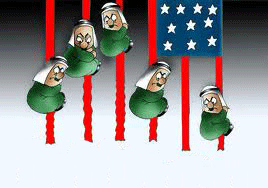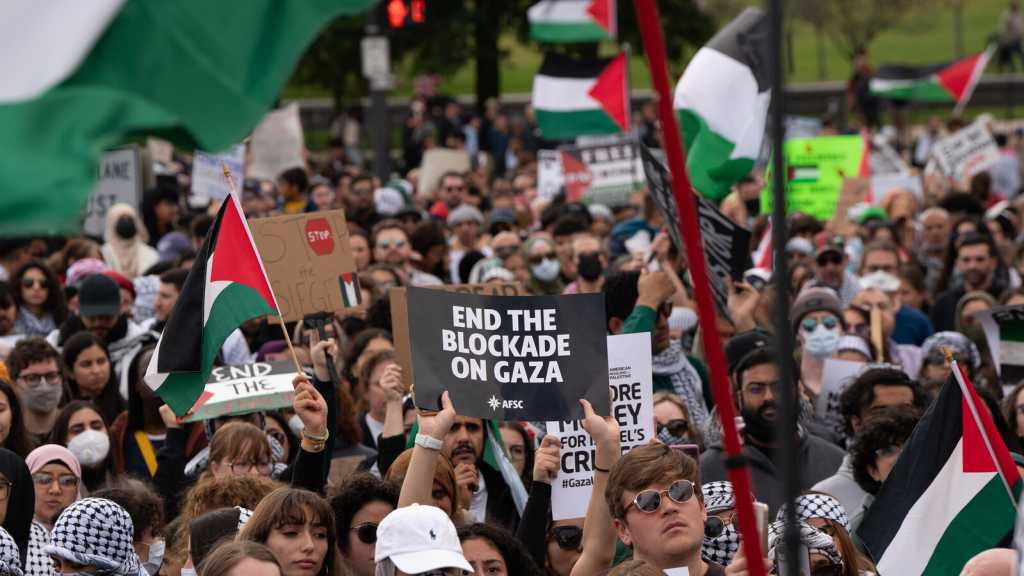Arab Americans, Victims of the International Community

Akil Sheikh Hussein
They are called "Arab Americans," or even "Arab Zionists." Yet another name, neither better nor worse, suits them just right, "the Arabs of the international community."
Just by listening to their mass media and to those among them occupying posts in their administrations, it is not before long we notice the sacred aspect glorifying their reference to the international community each time it votes a resolution or adopts a US-dictated measure at the Security Council or at any other UN instance.
 When it's about a measure relevant to Arab and Islamic affairs, for instance sanctions on Iran and Syria, the Special Tribunal for Lebanon, or even the arrest warrant issued by the International Criminal Court against Sudan's Omar al-Bashir, that sacred aspect must be certainly coupled with a threatening vanity.
When it's about a measure relevant to Arab and Islamic affairs, for instance sanctions on Iran and Syria, the Special Tribunal for Lebanon, or even the arrest warrant issued by the International Criminal Court against Sudan's Omar al-Bashir, that sacred aspect must be certainly coupled with a threatening vanity.
Even if protagonists managed to settle on a given dispute that is against
them yet already subject to an international instance, the Arab Americans would oppose it as, in their terms, this affair is the responsibility of the international community solely.
There is flatly no need to rake up that the international community is nothing but the US and its allies. And this is exactly why Arab Americans unswervingly hold onto it.
Nonetheless, since not a situation can resist change, it happens that the grip of the international community by a party or a bloc becomes in other hands, or that it becomes impossible for one party or bloc to impose their hegemony therein.
In early 1950s, it was through the UN General Assembly that the US and its allies could militarily intervene in Korea. Ten years later, that very assembly became a dais for the states of the East and the third world decolonized countries which constituted the National Liberation Movement and the non-aligned countries.
More often, only a slight minority like the United Kingdom, the Zionist entity and Gaullist France--which stood out of the American imperialist policies-supported the US at the General Assembly.
Of course, the US managed to impose its tutelage over the UN instances after the downfall of the Soviet Union and under Russian Presidents like Gorbatchev and Yeltsin. Yet not for a long time.

Russia and China's double vetoes on the war against Syria and the freeze of the US security council to that effect have somehow traumatized the Arabs of the international community who, just like one of their famous proverbs says, have put all their eggs in the basket of an international community that, all at once, was no more at the mercy of the US and its allies.
Desperate them, albeit thinking they are too smart and pretty versed about modern history (since knowledge of their prehistory and primordial past, then of their late history, is sapped by taboos whose mission is to stifle their genuine Arab identity), they solicit a General Assembly-mandated NATO intervention, just like in Korea.
If they do so, it is because they think, as smart as they believe they are, that the US and its allies lack "legal" evidence disallowing them from invading and demolishing Syria, or that they are short of fallacious pretexts like those they have used to invade Afghanistan and Iraq.
Anyhow, the solicitation of a NATO military intervention in Syria outside the Security Council has little chance to be mulled at the United Nations, something that has instigated the Arab Americans to change their rhetoric with respect to the international community. And then there was that speedy shift from the aforesaid sacred aspect to blames. There have been whining, grieving, and lamenting for the international community left the Syrian people to its destiny. Besides, high-ranking Turkish officials concluded that the US has not sufficiently upheld Ankara in its war against terrorism. They actually meant the lack of support in war against Syria, accused of backing Kurds in their warfare with the Turkish. It is well known that Erdogan's Turkey would really like to intervene in Syria, but under the condition of having the entire NATO intervening as well. However, the NATO does not seem to be ready for such a step.
At a lower scale, on the level of Syrian oppositions settling down in fancy hotels, the hope to reap the prime power after the so-called "Assad's departure" is fading away. But this is not quite a problem. Their investments in the Syrian "revolution" have guaranteed to them exorbitant bank accounts so that they live like true kings.
At a much lower scale, on the level of armed groups and their fellows duped by the redundant statements about President Assad's "imminent departure" since 17 months, frustration is at brim: they feel deserted. They insult the US and lob stabbing jabs against Arab regimes which they accuse of having failed to support them.
Those among them who comment on internet-published articles usually attack Iran, the Syrian regime, and Hizbullah. "To hell, now they exclaim, with the international community, the West, and Arab regimes. They all betrayed the Syrian revolution!"
Where shall they go now? At which enemy shall they aim their weapons? These are the questions they ought to answer now.
Source: al-Intiqad, translated and edited by moqawama.org
They are called "Arab Americans," or even "Arab Zionists." Yet another name, neither better nor worse, suits them just right, "the Arabs of the international community."
Just by listening to their mass media and to those among them occupying posts in their administrations, it is not before long we notice the sacred aspect glorifying their reference to the international community each time it votes a resolution or adopts a US-dictated measure at the Security Council or at any other UN instance.
 When it's about a measure relevant to Arab and Islamic affairs, for instance sanctions on Iran and Syria, the Special Tribunal for Lebanon, or even the arrest warrant issued by the International Criminal Court against Sudan's Omar al-Bashir, that sacred aspect must be certainly coupled with a threatening vanity.
When it's about a measure relevant to Arab and Islamic affairs, for instance sanctions on Iran and Syria, the Special Tribunal for Lebanon, or even the arrest warrant issued by the International Criminal Court against Sudan's Omar al-Bashir, that sacred aspect must be certainly coupled with a threatening vanity.Even if protagonists managed to settle on a given dispute that is against
them yet already subject to an international instance, the Arab Americans would oppose it as, in their terms, this affair is the responsibility of the international community solely.
There is flatly no need to rake up that the international community is nothing but the US and its allies. And this is exactly why Arab Americans unswervingly hold onto it.
Nonetheless, since not a situation can resist change, it happens that the grip of the international community by a party or a bloc becomes in other hands, or that it becomes impossible for one party or bloc to impose their hegemony therein.
In early 1950s, it was through the UN General Assembly that the US and its allies could militarily intervene in Korea. Ten years later, that very assembly became a dais for the states of the East and the third world decolonized countries which constituted the National Liberation Movement and the non-aligned countries.
More often, only a slight minority like the United Kingdom, the Zionist entity and Gaullist France--which stood out of the American imperialist policies-supported the US at the General Assembly.
Of course, the US managed to impose its tutelage over the UN instances after the downfall of the Soviet Union and under Russian Presidents like Gorbatchev and Yeltsin. Yet not for a long time.

Russia and China's double vetoes on the war against Syria and the freeze of the US security council to that effect have somehow traumatized the Arabs of the international community who, just like one of their famous proverbs says, have put all their eggs in the basket of an international community that, all at once, was no more at the mercy of the US and its allies.
Desperate them, albeit thinking they are too smart and pretty versed about modern history (since knowledge of their prehistory and primordial past, then of their late history, is sapped by taboos whose mission is to stifle their genuine Arab identity), they solicit a General Assembly-mandated NATO intervention, just like in Korea.
If they do so, it is because they think, as smart as they believe they are, that the US and its allies lack "legal" evidence disallowing them from invading and demolishing Syria, or that they are short of fallacious pretexts like those they have used to invade Afghanistan and Iraq.
Anyhow, the solicitation of a NATO military intervention in Syria outside the Security Council has little chance to be mulled at the United Nations, something that has instigated the Arab Americans to change their rhetoric with respect to the international community. And then there was that speedy shift from the aforesaid sacred aspect to blames. There have been whining, grieving, and lamenting for the international community left the Syrian people to its destiny. Besides, high-ranking Turkish officials concluded that the US has not sufficiently upheld Ankara in its war against terrorism. They actually meant the lack of support in war against Syria, accused of backing Kurds in their warfare with the Turkish. It is well known that Erdogan's Turkey would really like to intervene in Syria, but under the condition of having the entire NATO intervening as well. However, the NATO does not seem to be ready for such a step.
At a lower scale, on the level of Syrian oppositions settling down in fancy hotels, the hope to reap the prime power after the so-called "Assad's departure" is fading away. But this is not quite a problem. Their investments in the Syrian "revolution" have guaranteed to them exorbitant bank accounts so that they live like true kings.
At a much lower scale, on the level of armed groups and their fellows duped by the redundant statements about President Assad's "imminent departure" since 17 months, frustration is at brim: they feel deserted. They insult the US and lob stabbing jabs against Arab regimes which they accuse of having failed to support them.
Those among them who comment on internet-published articles usually attack Iran, the Syrian regime, and Hizbullah. "To hell, now they exclaim, with the international community, the West, and Arab regimes. They all betrayed the Syrian revolution!"
Where shall they go now? At which enemy shall they aim their weapons? These are the questions they ought to answer now.
Source: al-Intiqad, translated and edited by moqawama.org




